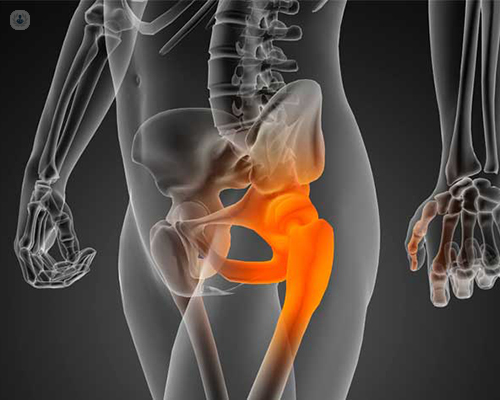Hip pain and your lifestyle: how everyday habits can affect your hips
Escrito por:Hip pain is a common complaint that can significantly affect a person’s mobility and quality of life. While injury or medical conditions are often associated with hip pain, everyday lifestyle habits can also have a major impact on the health of your hips.
What lifestyle habits can contribute to hip pain?
There are several everyday activities that can increase the risk of developing hip pain. These include:
- Sedentary lifestyle: lack of regular physical activity weakens muscles around the hips, which can lead to pain and stiffness. Sitting for prolonged periods places extra pressure on the hip joints and can worsen discomfort over time.
- Poor posture: bad posture, whether standing or sitting, can affect hip alignment. Slouching or sitting in awkward positions can create imbalances in the muscles surrounding the hips, leading to pain.
- Obesity: excess body weight adds stress to the hips, particularly the joints. This increases the risk of developing conditions like osteoarthritis, which is one of the leading causes of hip pain.
- Improper footwear: wearing shoes that do not provide adequate support, such as high heels or worn-out trainers, can cause improper gait (walking pattern) that may affect the hips. This strain can lead to hip pain over time.
- Repetitive motions: repetitive actions, such as running or cycling, without proper form or muscle conditioning, can cause strain on the hip joint, leading to pain or injury.
Can certain exercises improve hip health?
Yes, certain exercises can strengthen the muscles surrounding the hips and improve flexibility, helping to prevent or alleviate pain. Some of the most effective exercises for hip health include:
- Strengthening exercises: building strength in the muscles around the hips helps support the joints. Exercises like squats, lunges, and leg lifts target the gluteal muscles, which are essential for stabilising the hips.
- Stretching: regular stretching can improve flexibility and reduce tension in the muscles around the hips. Yoga and Pilates are particularly effective in promoting hip flexibility.
- Low-impact activities: swimming, walking, and cycling are low-impact activities that promote overall hip health without putting too much strain on the joints. These exercises can be great for individuals experiencing mild hip pain.
It is important to consult with a healthcare provider or physiotherapist before beginning any new exercise routine, especially if you are experiencing hip pain.
How can my weight affect my hip joints?
Carrying excess weight places additional strain on the hip joints, which can accelerate the wear and tear of cartilage. This can lead to conditions such as osteoarthritis, a degenerative joint disease that is a common cause of chronic hip pain.
Even moderate weight loss can reduce the stress on your hips, helping to alleviate pain and slow the progression of joint degeneration. Eating a balanced diet and engaging in regular physical activity are key strategies for maintaining a healthy weight and protecting your hips.

What role does posture play in hip pain?
Posture plays a significant role in how the hips function. Poor posture, particularly when sitting for extended periods, can cause the muscles around the hips to become imbalanced. This leads to increased strain on the hip joints and can result in pain or discomfort.
To improve posture and reduce the risk of hip pain:
- Sitting: choose a chair with good lumbar support, keep your feet flat on the ground, and avoid crossing your legs. Sit with your hips and knees at a 90-degree angle.
- Standing: when standing, ensure your weight is evenly distributed on both feet. Avoid leaning on one leg for long periods.
- Walking: keep your body upright and avoid slouching while walking. Make sure to wear supportive footwear that promotes a natural gait.
How can I prevent hip pain from worsening?
Preventing hip pain from worsening involves a combination of lifestyle changes and proactive care. Here are some key tips:
- Stay active: engage in regular, low-impact exercises that help keep the hip joints mobile and the surrounding muscles strong. Avoid prolonged periods of inactivity.
- Watch your weight: maintain a healthy weight to minimise stress on your hip joints.
- Proper footwear: invest in supportive shoes, particularly if you spend a lot of time on your feet. Shoes that cushion and support your arches can help reduce strain on the hips.
- Manage stress: stress can cause muscle tension, particularly in the lower back and hips. Practising relaxation techniques like deep breathing, meditation, or yoga can help manage stress and prevent tension from building up in the muscles.
- See a specialist: if hip pain persists or worsens, consult a healthcare provider or orthopaedic specialist for a proper diagnosis. Early treatment is essential for preventing further complications.
When should I seek medical advice for hip pain?
You should seek medical advice if:
- Hip pain persists for more than a few weeks despite lifestyle modifications.
- Pain intensifies, or you experience sudden, sharp pain in the hip area.
- You notice swelling, warmth, or redness around the hip joint.
- You experience difficulty walking, or the hip joint feels unstable.
- You have a reduced range of motion in the hip.
Your healthcare provider can evaluate your symptoms and suggest treatments that may include physical therapy, medications, or in some cases, surgical intervention.
Everyday habits play a significant role in hip health. By making simple changes to your posture, weight management, exercise routine, and footwear choices, you can prevent or alleviate hip pain. If your pain persists, it is important to seek professional medical advice to avoid further complications and maintain a good quality of life.
For personalised advice on managing hip pain, consider booking an appointment with a healthcare provider who can provide tailored guidance based on your individual needs.


